

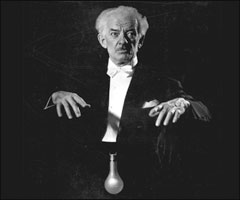 Harry
Blackstone
Harry
Blackstone
(1885 - 1965)
Born: Henry Boughton
Chicago, Illinois,
USA
Inducted 2004
�
One of the most prominent magicians of the twentieth century. His legacy lives on as the most famous family name in the history of magic, carried on by his son, Harry, Jr. until his untimely death in 1997.

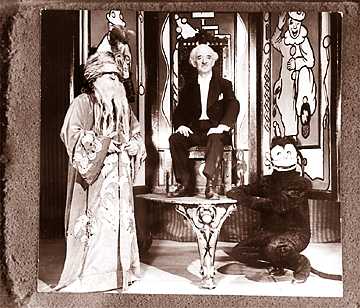 Henry
Boughton (Harry Blackstone, Sr.) was born on September 27, 1885, in Chicago,
Illinois. He began his career touring with his brother Pete in a vaudeville
act, and made his first appearance as magician Harry Blackstone at the
Grand Theater in Tiffin, Ohio. Known as a masterful showman, with a winning
stage presence and a wonderful sense of humor, he charmed children and
adults alike. His large-scale performances featured disappearing horses,
levitating princesses and buzz-sawed assistants. His famed shoe of “1001
Wonders” was especially elaborate: It required a full-to-the-brim
double-length railroad baggage car to travel around the country.
Henry
Boughton (Harry Blackstone, Sr.) was born on September 27, 1885, in Chicago,
Illinois. He began his career touring with his brother Pete in a vaudeville
act, and made his first appearance as magician Harry Blackstone at the
Grand Theater in Tiffin, Ohio. Known as a masterful showman, with a winning
stage presence and a wonderful sense of humor, he charmed children and
adults alike. His large-scale performances featured disappearing horses,
levitating princesses and buzz-sawed assistants. His famed shoe of “1001
Wonders” was especially elaborate: It required a full-to-the-brim
double-length railroad baggage car to travel around the country.
At Left: Harry Blackstone poses with one of his illusions, and his son, Harry, Jr. is in the monkey costume, working as part of the show.
�
Among Blackstone’s best-known illusions are the Floating Light Bulb, the Zig-Zag and the Vanishing Birdcage. He’s credited with extraordinary sleight-of-hand, too: In his Dancing Handkerchief routine, for example, he borrowed a handkerchief from an audience member and brought it to life, making it leap and dart around the stage before returning it to its astonished owner.
Blackstone was also the tenth member of the International Brotherhood of Magicians, which is the largest Magic organization in the world. It was founded in 1922 and Fantasma Toys is honored to be the only Toy company endorsed by this organization. Blackstone, Sr. proved to be an important figure in this organization’s early history.
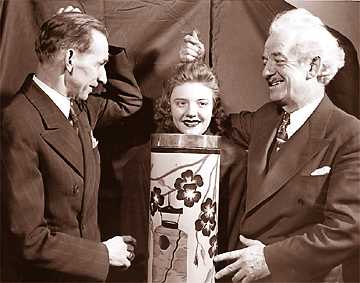 Blackstone
died in Hollywood, California, on November 16, 1965. A few days later
his ashes were interred at Lakeside Cemetery, across the water from his
longtime home in Colon, Michigan. The town's main street has been named
Blackstone Avenue, in memory of the man who was the consummate magician.
Blackstone
died in Hollywood, California, on November 16, 1965. A few days later
his ashes were interred at Lakeside Cemetery, across the water from his
longtime home in Colon, Michigan. The town's main street has been named
Blackstone Avenue, in memory of the man who was the consummate magician.
�
�
�
�
Blackstone, A Biographical
Sketch
By Daniel Waldron
Blackstone the Magician was born Henry Boughton on September 27, 1885,
in Chicago, Illinois, a son of Barbara and Alfred Boughton. He was known
as "Harry" all his life.
His love of performing showed itself early when, as a child, he emulated
traveling entertainers with backyard performances of his own. At age thirteen
he saw a presentation by Kellar, the leading magician of the day, and
his life's ambition was set.
Shortly before young Harry's fifteenth birthday his father died, leaving
a family which now included seven boys.
Harry found employment
at a woodworking shop; where one of the orders he handled called for construction
of some conjuring apparatus, he
made a replica for himself, and thereafter practiced and performed in
off-hours while still working at other jobs.
By 1905 he and his younger brother, Pete, were doing magic shows in and
around Chicago. By 1910 they'd dropped the "gh" from their name
and taken to the road with a vaudeville act known as "Harry Bouton
and Company in 'Straight and Crooked Magic'." Harry did a trick straight;
Pete followed with a comical burlesque. Through decades of trouping Pete
was rarely absent from Harry's side as fellow performer, backstage wonder-worker,
master mechanic, trusted confidant, and bulwark of inestimable strength.
�
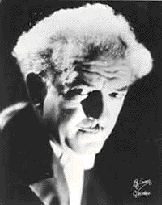
Harry's consuming dream was to have a big illusion show and from 1913
onward he began to make it a reality. He took on a new name--Fredrik the
Great--selecting it simply because it happened to be one printed on a
quantity of magician's unused advertising lithos which the hard-pressed
young performer could buy for next to nothing. Once the United States
entered World War 1, however, anti-German sentiment caused him to search
for a less sensitive name and on January 7, 1918, at the Grand Theater
in Tiffin, Ohio, he made his first appearance as "Blackstone, World's
Master Magician."
During the next decade he became one of the best-known magicians in America.
The speed and flash of his performing style were just what The Roaring
Twenties ordered and important bookings flowed in.
His show had crisscrossed Michigan many times since the start of his career
and in 1926 it was in Michigan, at the pleasant, secluded village of Colon,
in St. Joseph County, where he purchased some 208 acres of woods, fields,
and beachfront property on Sturgeon Lake. It would be his headquarters,
workshop, and, as it turned out, the most "permanent" home of
his peripatetic life. Here he and his company of performers could relax
each summer, and from here every season for the next 24 years the Blackstone
Magic Show set forth on its annual journey to entertain, baffle and delight
U.S. and Canadian audiences from coast to coast.
�
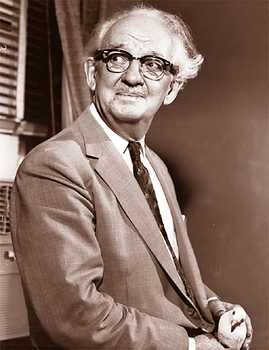
In 1927 Harry invited to Colon a visitor who was to have a further impact
upon the place of Michigan in the world of magic. Percy Abbott, an Australian
wizard, came to fish, stayed to help form The Blackstone Magic Company,
and when that dissolved, carried on by himself. Today Abbott's Magic Manufacturing
Company of Colon, Michigan, is the largest such enterprise--anywhere.
Abbott died some years ago but the firm continues to supply tricks of
the trade to conjurors throughout the word and yearly hosts the nation's
biggest convention of prestidigitators.
At left: Harry in 1957, with one of his doves.
Harry met the Great Depression of the 1930s head-on, with a cut-down one
hour version of the big two-and-a-half-hour full evening show, playing
three and four a day between films at movie theaters. The same June of
1934 in which he was named "King of Magicians" at a conclave
in Detroit saw the birth, in Three Rivers, Michigan, of son and heir,
Harry Blackstone, Jr.
When World War 11 came along, the Blackstone Show was the first to entertain
servicemen throughout the land for the newly-organized USO Camp Shows.
The long tour was a grueling one but after the war the Blackstone Show
was more popular than ever.
The glory years of the late 1940s saw the show at its height of success; but the bonanza was not to last. Television killed live show business, and in 1950 Blackstone's big show, the "Show of 1001 Wonders," the show which required a jam-packed double-length railroad baggage car to transport it around the country, made its last trip back to Michigan.
With characteristic optimism Harry mounted a smaller, lighter show with
fewer people and toured again. But in April of 1955, plagued by poor health
and dwindling box office receipts, he left the road for good.
He had performed continuously for half a century and magic was his life.
Happily, his last years were spent serenely at The Magic Castle, in Hollywood,
California. Here, just a few blocks from his residence, he could come
each evening to visit, greet throngs of friends and admirers, do tricks
for hours on end, and enjoy the adulation due the Last of the Big Time
Magicians.
He died in Hollywood on November 16,1965, at the age of eighty. A few
days later his ashes were interred at Lakeside Cemetery, just across the
water from his old home at Colon, Michigan.
When Harry Blackstone stepped onto the stage you knew you were in the
presence of "A Magician." Striding in, shoulders thrown back,
arms thrust slightly outward from his sides, elbows bent, his sturdy hands
poised as though ready to grapple with unseen forces, he seized the imagination
instantly. And when he stood center stage, erect as a pillar, his great
white head of hair glowing in the spotlight, a sudden smile of pleasure
passing over his face as the gloves which he briskly tossed into the air
turned into a fluttering dove before your very eyes--at that moment there
was no doubt in your mind that you would relax and be assured of enchantment.
Nor was there any
fear, as the sonorous, good-humored voice rose without electronic amplification
to the last row of the uppermost balcony, that you would have to strain
to help lift the dusty cares of life away. You could give yourself over
to the astonishment, laughter, awe and delight which lay ahead as horses
vanished, princesses floated, handkerchiefs danced, gorgeous girls were
buzz-sawed in half, birdcages disappeared from your own fingertips, and
people, rabbits, flowers, ducks, burros, bottles, and silken shawls appeared
from nowhere, behaved in incredible ways, underwent breathtaking transformations,
or vanished completely from human sight in the twinkling of an eye. You
were in good hands. You would leave the theater refreshed, full of wonder,
and wholly satisfied.
(This is an edited reproduction of "Blackstone, A
Biographical Sketch," first published by the Michigan Department
of State as a Great Lakes Informant (Series 1, Number 1). It is no longer
in print. � 1998 Michigan Historical Center.
| The
Guide - abracaDACRI
- school - mall
- books - organizations
- contact us - hall
of fame - news
�2000 - 2009 MagicWebChannel.com |